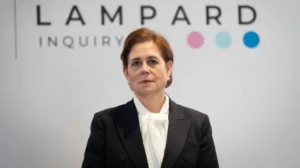‘The NHS at its worst’, ex-ombudsman tells inquiry
Sir Rob Behrens says it was a “disgrace” how mental health services failed two vulnerable men.
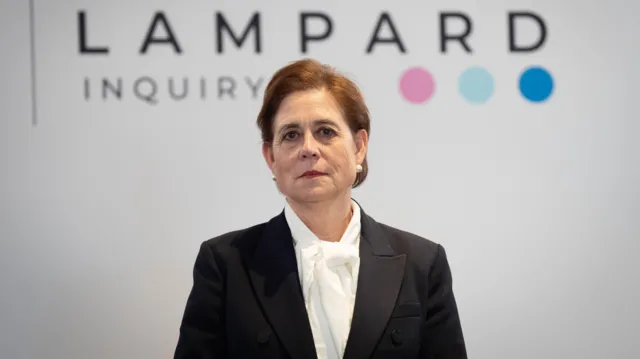
BBC News, Essex
BBC health correspondent
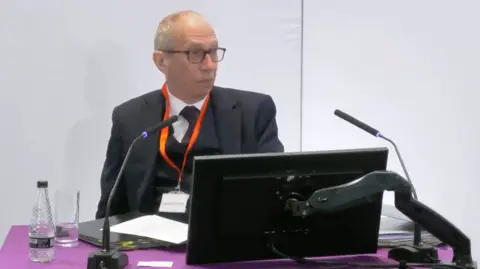 Lampard Inquiry
Lampard InquiryA former health ombudsman has condemned mental health services for their handling of two vulnerable young men who died in their care.
Sir Rob Behrens, who was parliamentary and health service ombudsman (PHSO) from 2017 to 2024, spoke at the Lampard Inquiry, which is examining the deaths of more than 2,000 people under mental health services in Essex over a 24-year period.
Sir Rob said it was “a disgrace” how Essex Partnership University NHS Foundation Trust (EPUT) had failed in its care of 20-year-old Matthew Leahy, who died in 2012, and a 20-year-old man referred to as Mr R, who died in 2008.
“This was the National Health Service at its worst and needed calling out,” Sir Rob said.
‘Near-complete failure’
Sir Rob referred in his inquiry appearance to several reports made during his tenure, including “Missed Opportunities”, which looked into the circumstances surrounding the deaths of Mr Leahy and Mr R.
Mr Leahy was found unresponsive at the Linden Centre in Chelmsford. He reported being raped there just days before he died.
Sir Rob told the inquiry the PHSO identified “19 instances of maladministration” in Mr Leahy’s case by North Essex Partnership University NHS Foundation Trust – a predecessor to EPUT – including that his care plan was falsified.
The former ombudsman said there had been “a near-complete failure of the leadership of this trust, certainly before it was merged” with South Essex Partnership Trust to become EPUT.
“This was an indictment of the health service,” he added.
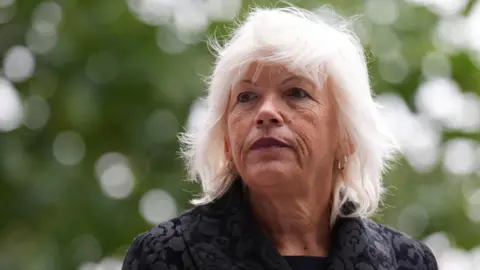 PA Media
PA MediaSir Rob paid tribute to Matthew’s mother, Melanie Leahy, who campaigned for more than a decade for a public inquiry, calling her “an exemplary complainant”.
“She was very well prepared for every meeting, she was courteous but assertive. She knew what she wanted out of an investigation.
“Given the tragedy that she’d been through, it was a remarkable contribution to public life that she performed over many years,” Sir Rob said.
He also said that the way some doctors spoke about Mr R was “staggering”.
Mr R was found unresponsive in the Linden Centre in December 2008 and died afterwards. Sir Rob Behrens found he had been failed multiple times by those treating him.
“Some clinicians were interviewed after he died, and they had a very patronising approach to him” he told the inquiry.
“In their view, [Mr R] didn’t have mental health problems at all, and he had been admitted because he wanted somewhere to live because he was homeless. That is staggering.”
‘No confidence’
In a report called “Broken Trust”, published in 2023, Sir Rob referenced there were more than a dozen different health and care regulators playing important roles in patient safety.
“Political leaders have created a confusing landscapes of organisations, often in knee-jerk reaction to patient safety crisis points,” the report said.
Sir Rob agreed with a suggestion put to him by Nicholas Griffin KC, chief counsel to the inquiry, that some incidents “fall through the gaps” due to the complexity of the complaints process and therefore are not investigated.
“There are a lot of people who simply don’t know where to go,” Sir Rob said.
“At the moment, I have no confidence that people trust the system because they don’t know where to go when they want to make a complaint.”
Sir Rob said that Essex was “not exceptional” and the issues he had discovered there could be seen in other places as well.
“The absence of leadership… not communicating effectively with patients, the safety issues around ligature points… and the absence of training and development – these are still issues which the NHS has to address generally, not just in Essex,” he said.
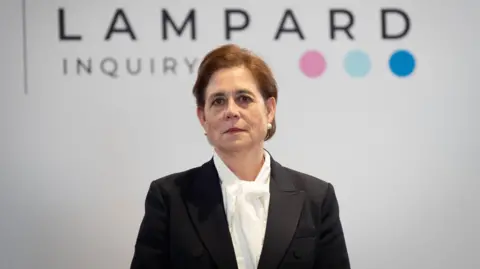 PA Media
PA MediaThe former ombudsman also told the inquiry that he was prevented from investigating a significant number of deaths due to a “serious limitation” in his office’s powers.
Sir Rob Behrens explained the ombudsman could only investigate following a complaint, but that for understandable reasons of bereavement or trauma, many families in Essex did not complain following the deaths of loved ones.
Sir Rob said if the ombudsman had the power to take its own initiative then “the resolution of these tragic issues could have been speeded up very dramatically”.
EPUT chief executive Paul Scott has apologised for deaths under his trust’s care.
He said: “As the inquiry progresses, there will be many accounts of people who were much loved and missed over the past 24 years and I want to say how sorry I am for their loss.”
The Lampard Inquiry will hear evidence across several sessions until July 2026, with Baroness Lampard’s report likely to be published in 2027.





